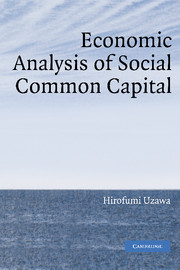Book contents
- Frontmatter
- Contents
- List of Figures
- Preface
- Introduction: Social Common Capital
- 1 Fisheries, Forestry, and Agriculture in the Theory of the Commons
- 2 The Prototype Model of Social Common Capital
- 3 Sustainability and Social Common Capital
- 4 A Commons Model of Social Common Capital
- 5 Energy and Recycling of Residual Wastes
- 6 Agriculture and Social Common Capital
- 7 Global Warming and Sustainable Development
- 8 Education as Social Common Capital
- 9 Medical Care as Social Common Capital
- Main Results Recapitulated
- References
- Index
Preface
Published online by Cambridge University Press: 18 December 2009
- Frontmatter
- Contents
- List of Figures
- Preface
- Introduction: Social Common Capital
- 1 Fisheries, Forestry, and Agriculture in the Theory of the Commons
- 2 The Prototype Model of Social Common Capital
- 3 Sustainability and Social Common Capital
- 4 A Commons Model of Social Common Capital
- 5 Energy and Recycling of Residual Wastes
- 6 Agriculture and Social Common Capital
- 7 Global Warming and Sustainable Development
- 8 Education as Social Common Capital
- 9 Medical Care as Social Common Capital
- Main Results Recapitulated
- References
- Index
Summary
Social common capital provides members of a society with those services and institutional arrangements that are crucial in maintaining human and cultural life. It is generally classified in three categories: natural capital, social infrastructure, and institutional capital. These categories are neither exhaustive nor exclusive; they merely illustrate the nature of functions performed by social common capital and the social perspectives associated with them.
Natural capital consists of the natural environment and natural resources such as forests, rivers, lakes, wetlands, coastal seas, oceans, water, soil, and, above all, the earth's atmosphere. They all share the common feature of being regenerative, subject to intricate and subtle forces of the ecological and biological mechanisms. They provide all living organisms, particularly human beings, with the environment to sustain their lives and to regenerate themselves.
Social infrastructure is another important component of social common capital. It consists of roads, bridges, public transportation systems, water, electricity, other public utilities, and communication and postal services, among others. Social common capital also includes institutional capital such as hospitals and medical institutions, educational institutions, judicial and police systems, public administrative services, financial and monetary institutions, cultural capital, and others. They all provide members of a society with services that are crucial in maintaining human and cultural life, without being unduly influenced by the vicissitudes of life.
Social common capital in principle is not appropriated to individual members of the society but rather is held as common property resources to be managed by the commons in question, without, however, precluding private ownership arrangements.
- Type
- Chapter
- Information
- Economic Analysis of Social Common Capital , pp. vii - xPublisher: Cambridge University PressPrint publication year: 2005



